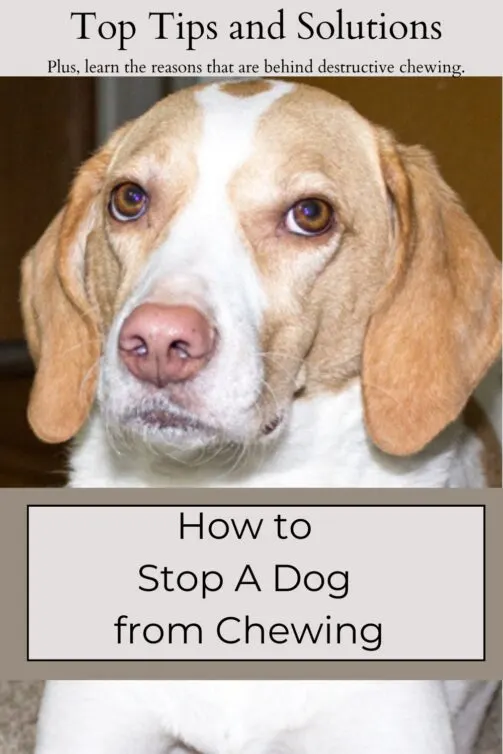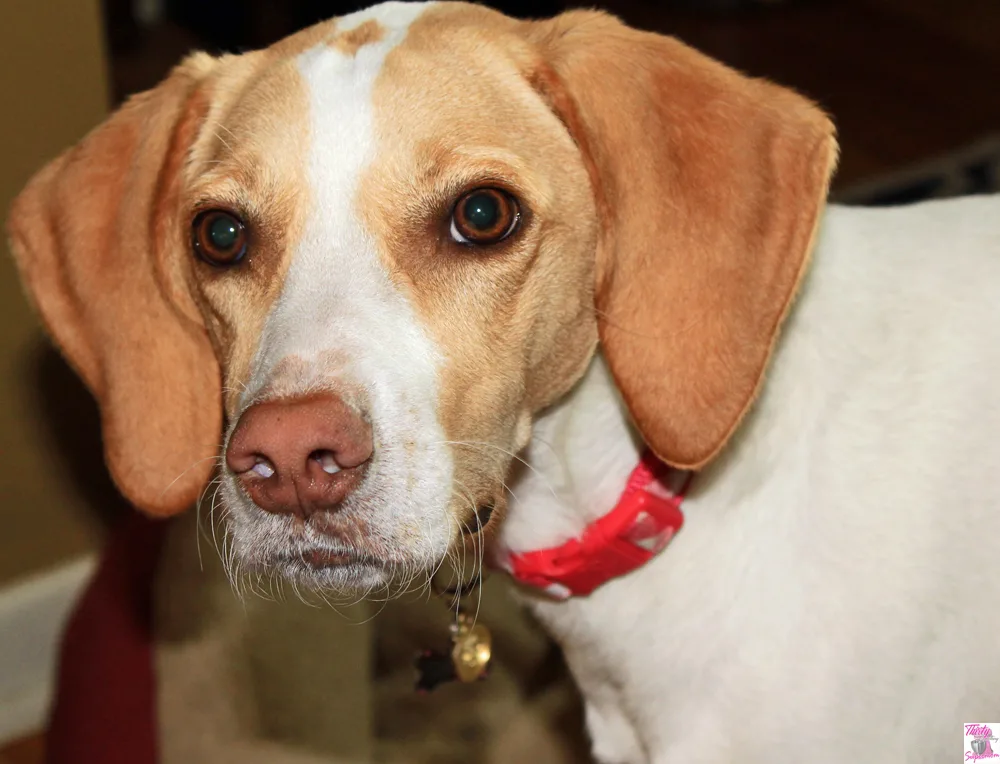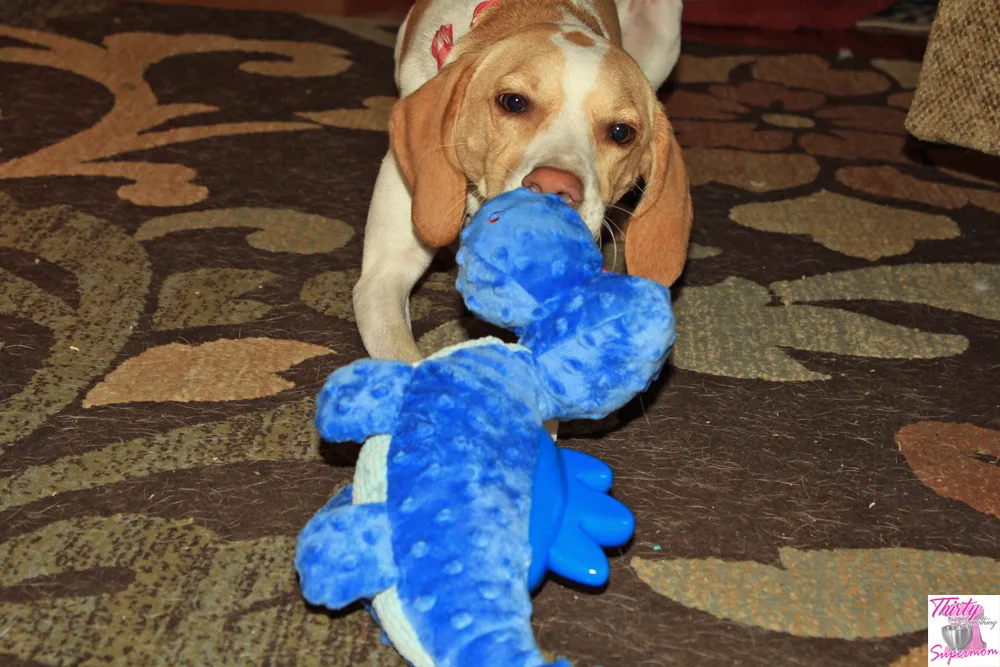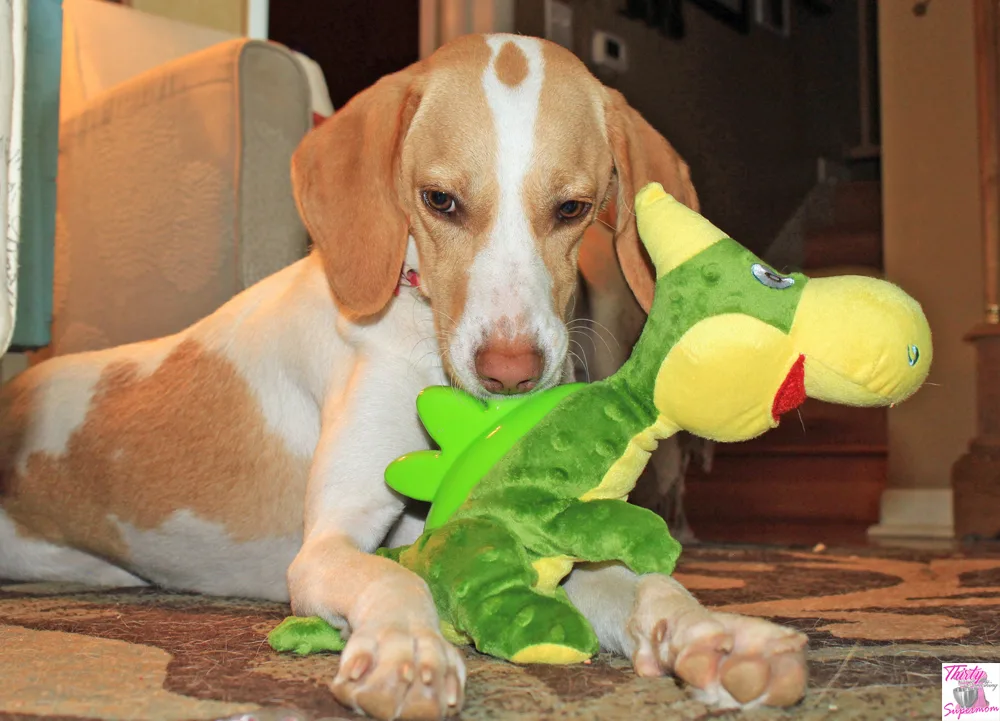If your dog is being destructive and chewing on your furniture or other items you wish they would leave alone, you may be wondering how to stop your dog from chewing. Luckily, there are many ways to address this behavior, but it’s essential to understand that dogs chew for various reasons.

There is no one-size-fits-all solution, and you may need to try several strategies to correct this behavior permanently.
Keep in mind that this post sharing how to stop your dog from chewing contains Amazon affiliate links which means that if you make a purchase after clicking a link, I will receive a small portion of the sale at no additional cost to you.
Understand Why Dogs Chew
Chewing is a natural behavior for dogs and can serve multiple purposes:
- Pacification: Much like babies use teething rings, puppies chew to relieve the discomfort of teething.
- Exploration: Dogs explore their world with their mouths.
- Boredom: Dogs might chew to entertain themselves if they’re bored.
- Anxiety: Chewing can be a coping mechanism for stress or anxiety.
Addressing destructive chewing effectively requires identifying the root cause and applying targeted solutions.

How to Stop Your Dog from Chewing
Destructive chewing can be frustrating for pet owners, but fear not – solutions abound. Understanding the underlying reasons behind your pet’s behavior is the first step towards effectively curbing it. From boredom to anxiety, there’s a myriad of triggers to consider.
However, armed with the right strategies, you can put an end to this behavior and foster a harmonious relationship with your furry friend. Let’s delve into some tried-and-tested methods to prevent dogs from chewing destructively.
Interrupt the Behavior
A quick and effective way to stop your dog from chewing is to interrupt the behavior. Create a noise to get their attention, such as shaking a jug full of coins or using a dog whistle. This method is most effective when used exclusively for correction, not play. Ensure the sound is associated with stopping the unwanted behavior.
Reward Good Behavior
Positive reinforcement is a powerful tool in dog training. Reward your dog with treats or praise when they follow commands or engage in appropriate behaviors. Training treats are a great option as they provide rewards without contributing to weight gain. This approach teaches your dog that good behavior is beneficial.
Related Article: 5 Reasons Why Playing Fetch Bonds You with Your Dog
Provide Regular Exercise
A well-exercised dog is less likely to engage in destructive behaviors. Regular walks and play sessions help burn off excess energy and keep your dog mentally stimulated. Incorporating daily exercise into your routine not only curbs chewing but also strengthens the bond between you and your pet.
Related Article: Learn the Signs of Heat Stroke in Dogs
Satisfy the Urge to Chew
Providing your dog with their own chew toys is crucial. Keep these toys in a designated area to help your dog distinguish between what is theirs to chew and what is off-limits. Consider durable toys like Kong or Nylabone, or bully sticks for aggressive chewers, and softer plush toys for less aggressive chewers.
Ensure Proper Dental Care
Dental health is essential for dogs. Chewing on dental treats like Greenies can help maintain their dental hygiene. These treats are not only beneficial for their teeth but also satisfying for their chewing needs. My dogs love Greenies, and since I order them from Chewy, it’s convenient and supports a healthy chewing habit.
Use a Deterrent
Applying a chew deterrent spray to areas or items your dog frequently chews can help curb the behavior. While not effective for every dog, deterrents work for many. Experiment with different deterrents to find one that works for your pet.
Dog-Proof the Area
Minimize the risk of destructive chewing by removing tempting items from your dog’s reach. Pick up shoes, throw pillows, and other chewable objects. Use baby gates to close off areas where you cannot supervise your dog. Always keep an eye on your dog and create an environment that promotes good behavior.

Understanding Why Dogs Chew and How to Address It
Identifying the underlying reasons for your dog’s chewing behavior is essential for effectively addressing it. Here are some common causes of destructive chewing and tailored solutions for each scenario:
Teething in Puppies
Why It Happens: Puppies chew to relieve the discomfort of teething.
Solutions:
- Teething Toys: Provide soft, chewable toys designed for teething puppies. Toys that can be chilled in the freezer are particularly soothing for sore gums.
- Frozen Washcloths: Soak a washcloth in water, twist it into a rope, and freeze it. This offers a cool, soothing chew option for teething puppies.
Boredom and Lack of Mental Stimulation
Why It Happens: Dogs may chew when they are bored and lack sufficient mental and physical activity.
Solutions:
- Interactive Toys: Invest in puzzle toys and interactive feeders to keep your dog mentally stimulated.
- Regular Exercise: Ensure your dog gets plenty of exercise through daily walks, playtime, and engaging activities.
- Doggy Daycare: Consider enrolling your dog in daycare if they are left alone for long periods.

Anxiety and Stress
Why It Happens: Dogs may chew to cope with anxiety, such as separation anxiety or fear of loud noises.
Solutions:
- Calming Aids: Use products like anxiety wraps, calming collars, or pheromone diffusers to help reduce stress.
- Training and Desensitization: Gradually expose your dog to anxiety triggers in a controlled manner, rewarding calm behavior.
- Professional Help: If anxiety is severe, consult with a veterinarian or a certified animal behaviorist.
This article from the ASPCA goes further into the topic and answers the question: Can Pets Suffer from Anxiety?
Hunger or Nutritional Deficiencies
Why It Happens: Some dogs chew and eat non-food items due to hunger or lack of nutrients.
Solutions:
- Balanced Diet: Ensure your dog is eating a balanced diet suitable for their age, size, and activity level. Consider a high-quality, nutrient-rich dog food.
- Chew Treats: Provide healthy chew treats that can satisfy their urge to chew while also offering nutritional benefits.
These Homemade Dog Jerky Dehydrated Chicken Treats for Dogs are perfect for obsessive chewers!
Want more recipes for your dog? Scroll to the bottom of this article to see a list of healthy, high-quality recipes for dogs that are simple to make and dog-approved.
Attention-Seeking Behavior
Why It Happens: Dogs may chew destructively to get attention from their owners.
Solutions:
- Ignore Unwanted Behavior: Do not give attention to your dog when they chew on inappropriate items.
- Positive Reinforcement: Reward your dog for good behavior, such as chewing on appropriate toys.
- Consistent Training: Use commands like “leave it” and “drop it” to manage and redirect chewing behavior.

Additional Quick Tips for Preventing Destructive Chewing
- Bitter Apple Spray: Apply this powerful pet deterrent to furniture and items to deter your dog from chewing on them.
- Training Commands: Teach basic commands like “leave it” and “drop it” to control chewing behavior.
- Safe Space: Create a dog-proofed area where your pet can stay when unsupervised, reducing the risk of chewing on inappropriate items.
For more tips on managing your dog’s behavior and providing them with healthy alternatives, check out these related articles:
Related Articles
- How to Stop a Dog from Eating Too Fast
- Recipe for Healthy Sweet Potato Dog Chews
- Easy Four Ingredient Homemade Dog Treats with Baby Food
- Grain-Free Dog Food Recipe
- 3 Ingredient Homemade Chicken Dog Treats
What tips and tricks have worked for you to stop your dog from chewing destructively? Share your experiences in the comments below!
About Thirty Something Super Mom

My journey started after a Crohn's disease diagnosis, inspiring a commitment to well-being. This site shares my distinctive approach to healthy living with my collection of nutritious recipes that boast authentic flavors, mimicking the indulgence of traditional dishes. I love sharing guilt free recipes for low carb, keto, gluten-free, paleo, and the specific carbohydrate diet. I also share tips on natural living, including homemade cleaners and cleaning hacks. I also share my experience as a veterinary technician and pet groomer, to integrate pet health tips, homemade dog food recipes, and grooming insights to ensure your pets thrive.

Jen
Thursday 6th of June 2024
Fortunately our chihuahua didn't chew on household things. These are great tips for future reference!
Marysa
Thursday 6th of June 2024
It is good to have some strategies to help with chewing. Thanks for the ideas and suggestions on what products help.
Lavanda
Thursday 6th of June 2024
Absolutely! Understanding why dogs chew is crucial for finding the right solutions. It's all about creating a happy environment for both you and your furry friend.
LisaLisa
Thursday 6th of June 2024
These are some great tips. I know back when we had our dog, we had to implement a few of these techniques to help our dog stop chewing everything and they worked very well.
laura
Thursday 6th of June 2024
These are great tips; my dog has a lot of stress and at times they tear up food items as well. I will be trying some of the tips that you mentioned in your post. thanks for sharing them with us.